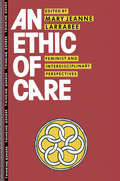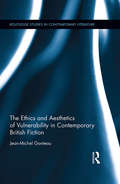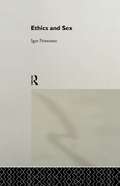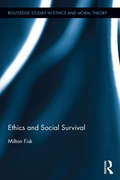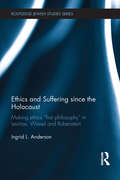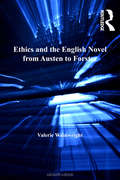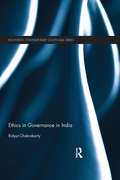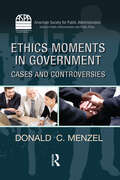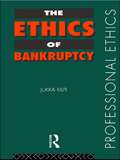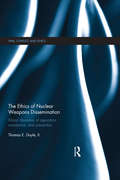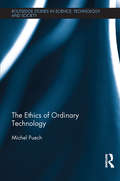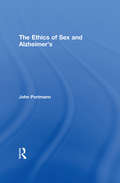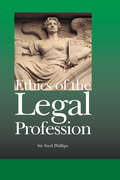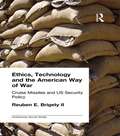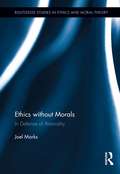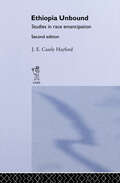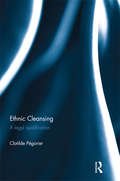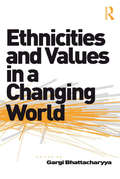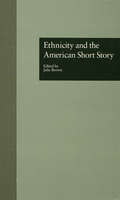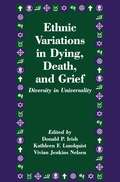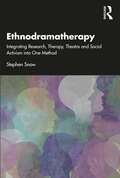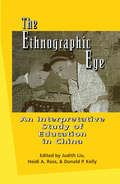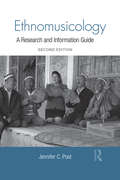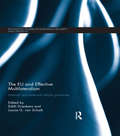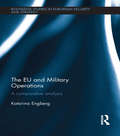Special Collections
Benetech’s Global Certified Accessible Titles
Description: Benetech’s GCA program is the first independent third-party EPUB certification to verify ebook accessibility. By creating content that is born accessible, publishers can meet the needs of all readers. Learn more: https://bornaccessible.benetech.org/
- Table View
- List View
An Ethic of Care
by Mary Jeanne LarrabeePublished in 1982, Carol Gilligan's In a Different Voice proposed a new model of moral reasoning based on care, arguing that it better described the moral life of women. An Ethic of Care is the first volume to bring together key contributions to the extensive debate engaging Gilligan's work. It provides the highlights of the often impassioned discussion of the ethic of care, drawing on the literature of the wide range of disciplines that have entered into the debate. Contributors: Annette Baier, Diana Baumrind, Lawrence A. Blum, Mary Brabeck, John Broughton, Owen Flanagan, Marilyn Friedman, Carol Gilligan, Catherine G. Greeno, Catherine Jackson, Linda K. Kerber, Mary Jeanne Larrabee, Zella Luria, Eleanor E. Maccoby, Linda Nicholson, Bill Puka, Carol B. Stack, Joan C. Tronto, Lawrence Walker, Gertrud Nunner-Winkler.
The Ethics and Aesthetics of Vulnerability in Contemporary British Fiction
by Jean-Michel GanteauThis book visits vulnerability in contemporary British fiction, considering vulnerability in its relation to poetics, politics, ethics, and trauma. Vulnerability and risk have become central issues in contemporary culture, and artistic productions have increasingly made it their responsibility to evoke various types of vulnerabilities, from individual fragilities to economic and political forms of precariousness and dispossession. Informed by trauma studies and the ethics of literature, this book addresses such issues by focusing on the literary evocations of vulnerability and analyzing various aspects of vulnerable form as represented and performed in British narratives, from contemporary classics by Peter Ackroyd, Pat Barker, Anne Enright, Ian McEwan, and Jeanette Winterson, to less canonical texts by Nina Allan, Jon McGregor, and N. Royle. Chapters on romance, elegy, the ghost story, and the state-of-the-nation novel draw on a variety of theoretical approaches from the fields of trauma studies, affect theory, the ethics of alterity, the ethics of care, and the ethics of vulnerability, among others. Showcasing how the contemporary novel is the privileged site of the expression and performance of vulnerability and vulnerable form, the volume broaches a poetics of vulnerability based on categories such as testimony, loss, unknowing, temporal disarray, and performance. On top of providing a book-length evocation of contemporary fictions of vulnerability and vulnerable form, this volume contributes significantly to considerations of the importance of Trauma Studies to Contemporary Literature.
Ethics and Sex
by Igor PrimoratzEthics and Sex presents a systematic study of the nature and moral significance of human sexuality and of the major issues in sexual morality.The book is divided into two main parts. Part One gives a critical analysis of the key conceptions of human sexuality. Part Two discusses the most important issues in sexual morality: monogamy; adultery; prostitution; homosexuality; paedophilia; sexual harassment and rape.In this controversial and accessible book, the author demonstrates that many of the prohibitions that make up conventional sexual morality cannot withstand critical scrutiny.
Ethics and Social Survival
by Milton FiskWhen speaking of society’s role in ethics, one tends to think of society as regimenting people through its customs. Ethics and Social Survival rejects theories that treat ethics as having justification within itself and contends that ethics can have a grip on humans only if it serves their deep-seated need to live together. It takes a social-survival view of ethical life and its norms by arguing that ethics looks to society not for regimentation by customs, but rather for the viability of society. Fisk traces this theme through the work of various philosophers and builds a consideration of social divisions to show how rationalists fail to realize their aim of justifying ethical norms across divisions. The book also explores the relation of power and authority to ethics—without simply dismissing them as impediments—and explains how personal values such as honesty, modesty, and self-esteem still retain ethical importance. Finally, it shows that basing ethics on avoiding social collapse helps support familiar norms of liberty, justice, and democracy, and strives to connect global and local ethics.
Ethics and Suffering since the Holocaust
by Ingrid L AndersonFor many, the Holocaust made thinking about ethics in traditional ways impossible. It called into question the predominance of speculative ontology in Western thought, and left many arguing that Western political, cultural and philosophical inattention to universal ethics were both a cause and an effect of European civilization's collapse in the twentieth century. Emmanuel Levinas, Elie Wiesel and Richard Rubenstein respond to this problem by insisting that ethics must be Western thought's first concern. Unlike previous thinkers, they locate humanity's source of universal ethical obligation in the temporal world of experience, where human suffering, rather than metaphysics, provides the ground for ethical engagement. All three thinkers contend that Judaism’s key lesson is that our fellow human is our responsibility, and use Judaism to develop a contemporary ethics that could operate with or without God. Ethics and Suffering since the Holocaust explores selected works of Levinas, Wiesel, and Rubenstein for practical applications of their ethics, analyzing the role of suffering and examining the use each thinker makes of Jewish sources and the advantages and disadvantages of this use. Finally, it suggests how the work of Jewish thinkers living in the wake of the Holocaust can be of unique value to those interested in the problem of ethics in the twentieth and twenty-first centuries. Presenting a thorough investigation of the work of Levinas, Wiesel and Rubinstein, this book is of key interest to students and scholars of Jewish studies, as well as Jewish ethics and philosophy.
Ethics and the English Novel from Austen to Forster
by Valerie WainwrightComplicating a pervasive view of the ethical thought of the Victorians and their close relations, which emphasizes the domineering influence of a righteous and repressive morality, Wainwright discerns a new orientation towards an expansive ethics of flourishing or living well in Austen, Gaskell, Dickens, Eliot, Hardy and Forster. In a sequence of remarkable novels by these authors, Wainwright traces an ethical perspective that privileges styles of life that are worthy and fulfilling, admirable and rewarding. Presenting new research into the ethical debates in which these authors participated, this rigorous and energetic work reveals the ways in which ideas of major theorists such as Kant, F. H. Bradley, or John Stuart Mill, as well as those of now little-known writers such as the priest Edward Tagart, the preacher William Maccall, and philanthropist Helen Dendy Bosanquet, were appropriated and reappraised. Further, Wainwright seeks also to place these novelists within the wider context of modernity and proposes that their responses can be linked to the on-going and animated discussions that characterize modern moral philosophy.
Ethics in Governance in India
by Bidyut ChakrabartyGovernance and ethics are intertwined. A government functions within certain broad moral and ethical parameters, integrally linked with the sociological foundation of the polity in which it is articulated. The importance of ethics in governance has acquired a significant place in contemporary theoretical discussion. This book situates ethics in governance in India in the national frame and incorporates the context of globalization, allowing for the increasing importance of non-state global actors in national decision making. The author argues that a lack of ethics quickly turns into corruption and leads to governmental efforts to deal with it. He proposes that ethics are a set of standards that a society places on itself to articulate its responses to societal needs, and discusses the efforts of the Indian government at eradicating corruption and its failure. A theoretical approach to the issues of ethics in governance and corruption, this book is of interest to academics in the fields of Asian Politics, in particular Indian politics, and political philosophy.
Ethics Moments in Government
by Donald C. MenzelEthical concerns are among the most common problems public administrators face, yet the issues are often complex, and the correct choices are not always clear. Living up to the public trust is much more than just an act of compliance. It also involves perceiving, preventing, avoiding, and resolving accusations of illegal or unethical behavior, including appearances of inappropriate behavior. Ethics Moments in Government: Cases and Controversies examines how to identify, assess, and resolve the ethical issues and dilemmas that often confront those who govern the cities, counties, states, and federal agencies throughout America. Real Situations, Real Advice Providing a one-stop resource for all those who must contend with thorny ethical issues, this volume presents case studies that vary in complexity and context and are based on real situations. Each case scenario is followed by discussion questions and case assessments by expert practitioners who describe how they would handle the situation. Using a "total immersion" technique, the book encourages readers to be reflexive and analytical in addressing the problems presented and arriving at appropriate solutions. A supplemental CD is included which contains PowerPoint® slide presentations, articles, workshop programs, tests, and links to organizations. For many of the scenarios presented in this volume, there are no easy answers. Practical guidance on reasoning through difficult decision-making situations enables public administrators to acquire the ethical knowledge, skills, abilities, and instincts that will ultimately help them gain the trust of their citizens and advance in their careers.
The Ethics of Bankruptcy
by Jukka KilpiThe fundamental ethical problem in bankruptcy is that insolvents have promised to pay their debts but can not keep their promise. The Ethics of Bankruptcy examines the morality of bankruptcy. The author compares and contrasts the Humean doctrine of promises as useful conventions with the Kantian view of autonomous agency constituting promissory obligations; he explores ethical concerns raised by forgiveness, utilitarianism and distributive justice and the moral aspects of insolvents' contractual, fiduciary, tortious and criminal liability. Finally, the author assesses recent bankruptcy law reforms. Bankruptcies severly hurt creditors and society. For the insolvents and their families the experience is painful and stigmatising, yet philosophers have paid little attention to the moral aspects of this violent social phenomenon. The Ethics of Bankruptcy is the first comprehensive study that employs the tools of ethics to examine the controversies surrounding insolvency, which makes valuable and sometimes controversial reading in a decade recovering from the Recession.
The Ethics of Nuclear Weapons Dissemination
by Thomas E. Doyle, IIThis book examines the moral dilemmas of nuclear dissemination, and the justifications of both nuclear pursuit and avoidance by contemporary states. Applying Constructivist methodologies and moral theory, the author analyses a core set of moral dilemmas that ensnare decision-makers amongst state and non-state nuclear aspirants, as well as amongst states committed to preventing horizontal proliferation. The book shows that the character, structure and implications of these dilemmas have not yet been adequately understood or appreciated, and that such an understanding is necessary for an effective set of nonproliferation policies. Furthermore, it shows that the dilemmas’ force and political policy import are evident in the 'discourses' that diverse actors undertake to defend their nuclear choices, and how the dilemmas of nuclear aspirants are implicated in those of nuclear preventers. The author advocates a number of policy recommendations that reinforce some already made by scholars and experts but, more importantly, others that advise significantly different courses of action. The book reveals how the moral dilemmas of nuclear aspiration, avoidance, and prevention constitute the security dilemmas and paradoxes that comprise much of the 21st century security environment. This book will be of much interest to students of nuclear proliferation, international relations, ethics, and international security studies.
The Ethics of Ordinary Technology
by Michel PuechTechnology is even more than our world, our form of life, our civilization. Technology interacts with the world to change it. Philosophers need to seriously address the fluidity of a smartphone interface, the efficiency of a Dyson vacuum cleaner, or the familiar noise of an antique vacuum cleaner. Beyond their phenomenological description, the emotional experience acquires moral significance and in some cases even supplies ethical resources for the self. If we leave this dimension of modern experience unaddressed, we may miss something of value in contemporary life. Combining European humanism, Anglophone pragmatism, and Asian traditions, Michel Puech pleads for an "ethical turn" in the way we understand and address technological issues in modern day society. Puech argues that the question of "power" is what needs to be reconsidered today. In doing so, he provides a three-tier distinction of power: power to modify the outer world (our first-intention method in any case: technology); power over other humans (our enduring obsession: politics and domination); power over oneself (ethics and wisdom).
The Ethics of Sex and Alzheimer's
by John PortmannA growing epidemic, Alzheimer’s punishes not only its victims but also those married to them. This book analyzes how Alzheimer’s is quietly transforming the way we think about love today. Without meaning to become rebels, many people who find themselves "married to Alzheimer’s" deflate the predominant notion of a conventional marriage. By falling in love again before their ill spouse dies, those married to Alzheimer’s come into conflict with central values of Western civilization – personal, sexual, familial, religious, and political. Those who wait sadly for a spouse’s death must sometimes wonder if the show of fidelity is necessary and whom it helps. Most books on Alzheimer’s focus on those who have it, as opposed to those who care for someone with it. This book offers a powerful and searching meditation on the extent to which someone married to Alzheimer’s should be expected to suffer loneliness. The diagnosis of dementia should not amount to a prohibition of sexual activity for both spouses. Portmann encourages readers to risk honesty in assessing the moral dilemma, using high-profile cases such as Nancy Reagan and Justice Sandra Day O'Connor to illustrate the enormity of the problem. Ideal for classes considering the ethics of aging and sexuality.
Ethics of the Legal Profession
by Sir Fred PhillipsIn countries outside the developed world, although writers have written commentaries on specific legal codes, very little attention has been given to legal writing which has focused specifically on the ethics of the legal profession. This book makes a special contribution in that regard providing, as it does, a comparative study of prevailing efforts to enhance ethical standards in a profession potentially in crisis and under much public scrutiny. Countries which have been examined include the UK, the US, Canada, South Africa, and countries in the Pacific, South East Asia and the Caribbean. Valuable guidance and learning are provided on such topical issues as wasted costs orders, conflicts of interests, legal and judicial codes, confidentiality, privilege and the ethics of the criminal process, where the jury system comes in for critical evaluation. This book will be a valuable text on the ethics and status of the profession. It will be of considerable interest to law students, practitioners and legal academics, Bar Associations, Attorneys-General and Directors of Public Prosecutions as well as members of the judiciary.
Ethics, Technology and the American Way of War
by Reuben E. Brigety IIA new investigation into how the advent of precision-guided munitions affects the likelihood of US policy makers to use force. As such, this is an inquiry into the impact of ethics, strategy and military technology on the decision calculus of national leaders. Following the first Gulf War in 1991, this new study shows how US Presidents increasingly used stand-off precision guided munitions (or "PGMs", especially the Tomahawk cruise missile) either to influence foreign adversaries to make specific policy choices or to signal displeasure with their actions. Such uses of force are attractive because they can lead to desirable policy outcomes where conventional diplomacy has failed but without the large cost of lives, economic resources, or political capital that result from large-scale military operations. In a post-9/11 world, understanding alternative uses of force under significant policy constraints is still of supreme importance.
Ethics without Morals
by Joel MarksIn this volume, Marks offers a defense of amorality as both philosophically justified and practicably livable. In so doing, the book marks a radical departure from both the new atheism and the mainstream of modern ethical philosophy. While in synch with their underlying aim of grounding human existence in a naturalistic metaphysics, the book takes both to task for maintaining a complacent embrace of morality. Marks advocates wiping the slate clean of outdated connotations by replacing the language of morality with a language of desire. The book begins with an analysis of what morality is and then argues that the concept is not instantiated in reality. Following this, the question of belief in morality is addressed: How would human life be affected if we accepted that morality does not exist? Marks argues that at the very least, a moralist would have little to complain about in an amoral world, and at best we might hope for a world that was more to our liking overall. An extended look at the human encounter with nonhuman animals serves as an illustration of amorality’s potential to make both theoretical and practical headway in resolving heretofore intractable ethical problems.
Ethiopia Unbound
by J.E.Caseley HayfordFirst published in 1969. Routledge is an imprint of Taylor & Francis, an informa company.
Ethnic Cleansing
by Clotilde PegorierThis book confronts the problem of the legal uncertainty surrounding the definition and classification of ethnic cleansing, exploring whether the use of the term ethnic cleansing constitutes a valuable contribution to legal understanding and praxis. The premise underlying this book is that acts of ethnic cleansing are, first and foremost, a criminal issue and must therefore be precisely placed within the context of the international law order. In particular, it addresses the question of the specificity of the act and its relation to existing categories of international crime, exploring the relationship between ethnic cleansing and genocide, but also extending to war crimes and crimes against humanity. The book goes on to show how the current understanding of ethnic cleansing singularly fails to provide an efficient instrument for identification, and argues that the act, in having its own distinctive characteristics, conditions and exigencies, ought to be granted its own classification as a specific independent crime. Ethnic Cleansing: A Legal Qualification, will be of particular interest to students and scholars of International Law and Political Science.
Ethnicities and Values in a Changing World
by Gargi BhattacharyyaRecent debates about national identity, belonging and community cohesion can appear to suggest that ethnicity is a static entity and that ethnic difference is a source of conflict in itself - Ethnicities and Values in a Changing World presents an alternative account of ethnicity. This volume brings together an international team of leading scholars in the field of ethnic studies in order to examine innovative articulations of ethnicity and challenge the contention that ethnicity is static or that it necessarily represents traditional values and cultures. It will appeal not only to sociologists, but to anyone working in the fields of cultural studies, race and ethnicity, globalization, migration and anthropology.
Ethnicity and the American Short Story
by Julie BrownHow do different ethnic groups approach the short story form? Do different groups develop culture-related themes? Do oral traditions within a particular culture shape the way in which written stories are told? Why does "the community" loom so large in ethnic stories? How do such traditional forms as African American slave narratives or the Chinese talk-story shape the modern short story? Which writers of color should be added to the canon? Why have some minority writers been ignored for such a long time? How does a person of color write for white publishers, editors, and readers?Each essay in this collection of original studies addresses these questions and other related concerns. It is common knowledge that most scholarly work on the short story has been on white writers: This collection is the first work to specifically focus on short story practice by ethnic minorities in America, ranging from African Americans to Native Americans, Chinese Americans to Hispanic Americans. The number of women writers discussed will be of particular interest to women studies and genre studies researchers, and the collections will be of vital interest to scholars working in American literature, narrative theory, and multicultural studies.
Ethnic Variations in Dying, Death and Grief
by Donald P. Irish and Kathleen F. Lundquist and Vivian Jenkins NelsenThis volume is directed towards professionals who work in the fields concerning death and dying. These professionals must perceive the needs of people with cultural patterns which are different from the "standard and dominant" patterns in the United States and Canada. Accordingly, the book includes illustrative episodes and in-depth presentations of selected "ethnic patterns".; Each of the "ethnic chapters" is written by an author who shares the cultural traditions the chapter describes. Other chapters examine multicultural issues and provide the means for personal reflection on death and dying. There are also two bibliographic sections, one general and one geared towards children. The text is divided into three sections - Cross-Cultural and Personal perspectives, Dying, Death, and Grief Among Selected Ethnic Communities, and Reflections and Conclusions.; The book is aimed at those in the fields of clinical psychology, grief therapy, sociology, nursing, social and health care work.
Ethnodramatherapy
by Stephen SnowEthnodramatherapy explores the integration of the performance ethnography method, known as ethnodrama, with the principles and practices of drama therapy to establish a sound theoretical formulation for ethnodramatherapy, and considers its use as art, as therapy, as research and as a vehicle for social justice. The book begins by defining ethnodramatherapy – an original synthesis created by the author through deep study and practice of Mienczakowski’s enthnodrama, combined with 35 years of his own practice and research in drama therapy, creative arts therapies and therapeutic theatre. The book describes the origins of ethnodramatherapy, along with its evolution and method. It then delves into applications of the practice highlighted by five case studies with different audiences in different settings. Subjects include adults with developmental disabilities, female adolescents in youth protection, caregivers for loved ones with mental illnesses and Chinese students exploring controversial issues of oppression in China. Complex ethical issues are reviewed and suggestions are made on how to deal with some of the challenging ethical situations that are likely to arise in the ethnodramatherapy process. What emerges is a powerful tool that harnesses theatrical art, ethnographic research and the clinical techniques of drama therapy to create a potential for emancipatory experience for both performers and audiences. This exciting and dynamic synthesis of drama therapy, performance ethnography, theatrical art and social activism will be of interest to the whole community of theatre practitioners and scholars who use theatre to effect individual and social change, including the disciplines of applied theatre, theatre education, experimental theatre, performance studies, and, of course, drama therapy, psychodrama and the other creative arts therapies.
The Ethnographic Eye
by Heidi Ross and Judith LiuFirst Published in 2000. Routledge is an imprint of Taylor & Francis, an informa company.
Ethnomusicology
by Jennifer PostFirst published in 2011. Routledge is an imprint of Taylor & Francis, an informa company.
The EU and Effective Multilateralism
by Edith Drieskens and Louise G. van SchaikThis book investigates the extent to which the EU has defined and operationalised the notion of effective multilateralism. Reform has dominated the agenda of the EU in recent years with the adoption and implementation of the Lisbon Treaty. However, various international organisations have also been in reform mode in an attempt to adjust their structure to the changing polarity and counter criticisms about a lack of legitimacy, accountability and effectiveness. The EU and Effective Multilateralism examines the EU’s intention to make multilateral settings more effective, as formulated by the European Security Strategy in December 2003. Firmly grounded in new empirical research, it provides a balanced account of the fit between internal reform (the institutional reform within the EU, notably following the entry into force of the Lisbon Treaty) and external reform (the institutional reform of the international reform in which the EU operates). This book will be of much interest to students of EU politics, European security, international organisations, foreign policy and IR in general.
The EU and Military Operations
by Katarina EngbergThis book is a comparative study which aims to answer the question: under what circumstances does the EU undertake military operations? Since 2003, the EU has carried out six military operations. What accounts for this historic development? The EU and Military Operations examines the dynamics behind the EU´s collective use of force and situates the EU in the context of a global division of labour with regard to military crisis management. It centres on the study of two main cases of EU military operations: the non-case when an operation was planned in the Lebanon war 2006 but did not occur, and the positive case of EUFOR RD Congo that same year. Drawing upon these findings, the author creates an innovative analytical framework based upon the techniques of defence planning, and applies this to the cases studies with the purpose of identifying the main driving and inhibiting factors behind the operations. Key findings derived from this analysis include the growing importance of local actors in facilitating or impeding the EU´s deployment of military force and the enhanced role of regional organisations as security providers. The book will be of much interest to students of European security, EU politics, strategic studies, humanitarian intervention, security studies and IR in general.
